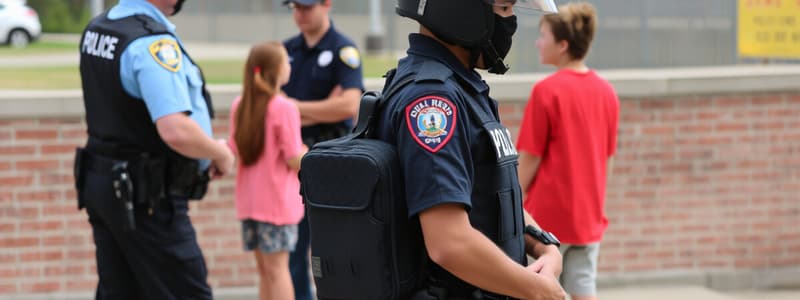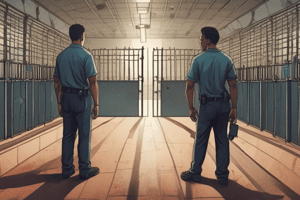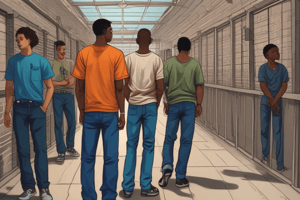Podcast
Questions and Answers
What is the primary role of juvenile officers?
What is the primary role of juvenile officers?
- To conduct criminal investigations
- To specialize in dealing with juvenile offenders (correct)
- To enforce adult laws
- To manage prison populations
What does arrest mean in the context of juvenile justice?
What does arrest mean in the context of juvenile justice?
Taking a person into the custody of the law to restrain the accused until he or she can be held accountable for the offense in court proceedings.
Define discretion in the criminal justice system.
Define discretion in the criminal justice system.
The use of personal decision making and choice in carrying out operations in the criminal justice system.
What are role conflicts faced by police officers concerning juvenile offenders?
What are role conflicts faced by police officers concerning juvenile offenders?
What does probable cause refer to in juvenile justice?
What does probable cause refer to in juvenile justice?
What is procedural justice?
What is procedural justice?
What are some considerations when using juvenile informants?
What are some considerations when using juvenile informants?
What influences police responses and programs to juvenile crime?
What influences police responses and programs to juvenile crime?
Are the laws of arrest the same for juveniles and adults?
Are the laws of arrest the same for juveniles and adults?
Miranda warnings are not applicable to juveniles.
Miranda warnings are not applicable to juveniles.
What are some issues concerning bias and police discretion in juvenile cases?
What are some issues concerning bias and police discretion in juvenile cases?
What is the GREAT program?
What is the GREAT program?
How does community policing benefit juvenile justice?
How does community policing benefit juvenile justice?
Flashcards are hidden until you start studying
Study Notes
Juvenile Justice Key Concepts
- Juvenile officers are specialized police who manage juvenile offenders, either independently or as part of a dedicated unit within the police department.
- Arrest refers to placing an individual in legal custody to ensure accountability for an alleged offense during court proceedings.
- Discretion involves police officers making personal choices regarding law enforcement actions, such as arrests or plea deals.
- Role conflicts arise when police balance their enforcement duties with the desire to rehabilitate younger offenders, leading to competing priorities.
- Probable cause is established when there are reasonable grounds to believe a crime occurred and that the suspect committed it.
- Procedural justice assesses the fairness in how police handle disputes involving offenders.
- Juvenile informants are often used in minor cases, creating tension for police who must protect vulnerable juveniles while gathering evidence.
- Different programs and police responses to juvenile crime are shaped by statutes, constitutional law, and judicial oversight, focusing on arrests, searches, and interrogations.
- Arrest standards and search/seizure rules for juveniles mirror those for adults, yet police maintain broader authority over youth behavior; custodial care is protective, not punitive, and illegal evidence cannot be used in juvenile court.
Interrogation and Rights
- Interrogation rules are similar for juveniles, who must receive Miranda warnings. The comprehension and waiver of these rights can vary significantly with age, sparking legal and ethical debates.
Discrimination and Bias
- Police often rely on personal discretion when handling juvenile offenses, but this can lead to discrimination; African Americans face disproportionately high rates of stops and arrests, while lower-class neighborhoods experience higher arrest rates due to systemic biases.
Programs and Community Engagement
- The GREAT program (Gang Resistance Education and Training) aims to prevent youth gang involvement through collaborations between police and schools, modeled after the DARE initiative.
- Community-oriented policing emphasizes building trust with local citizens to enhance effectiveness in combatting juvenile crime, while problem-oriented policing focuses on addressing the root causes of delinquency, proving effective in reducing youth crime rates.
Studying That Suits You
Use AI to generate personalized quizzes and flashcards to suit your learning preferences.





